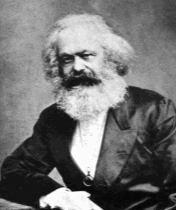|
Introduction to "Diamat"
The term "dialectical materialism" was not used by Marx or Engels. The Russian philosopher Georgi Plekhanov was probably the first to use the term. Besides Marx and Engels, and Plekhanov, early sources for dialectical materialism were the works of Joseph Dietzgen and Vladimir Lenin (click here). There was extensive debate on the content of dialectical materialism in the USSR in the 1920s, resulting in 1931 in several textbooks that were regarded as definitive for several decades. One of these textbooks was partially translated into English in 1937 (click here). Both textbooks were also translated into Chinese in the 1930s. These were the basis for Mao Zedong's well-known essays "On Practice" and "On Contradiction." Extensive academic institutions for the elaboration of dialectical materialism were created in both the USSR and the People's Republic of China. These institutions adapted it to scientific developments and to the leaders' political purposes in both countries.
Dialectics
The most basic ideas of dialectics are easy to state: Everything contains internal conflicts called "dialectical contradictions." These contradictions produce changes, small and large, inside things or processes until the contradictions cease to exist. Explaining how these concepts work is a big job. Click here for an introductory essay: Introduction to Marxist Dialectics.
Materialism and Idealism
Obviously dialectical materialism is a form of materialism. The concept of materialism does not have a brief definition, but it includes the following ideas:
1. What is material must have tendencies and follow laws of development that are objective, that is, which operate even if people are not aware of them or misunderstand them. This does not mean that social reality is independent of thought, since most social relations can only function if people who participate in them have certain beliefs and communicate their thoughts to others.
2. What we think comes from material reality, "reflects" both natural and social reality, although perhaps in a distorted form. Idealism, the opposite of materialism either denies that material reality exists at all, or claims that consciousness, ideas or non-material beings impose characteristics on matter.
3. Besides the natural reality that existed before there were any people at all, material reality also includes the social and economic relationships between people.
4. Individual people develop their characteristics and their characters through their life experiences, not from some "soul" or "divine plan" that determines what they are or can be.
5. People's knowledge derives from their practical experience and must be tested in practice and modified to yield greater success in practice. (For more on what practice is, click here for the essay: What Practice Is.)
Certainly this sketch of materialism needs to be filled in. Future blog entries and other parts of this website will try to do that.
Why Accept Dialectical Materialism?
These days, quite a few people who sympathize with Marxism reject or express skepticism about dialectical materialism. I think there are two important reasons for this. One is the behavior and politics of the USSR. By the 1960s many people saw little that deserved imitation in the USSR and much that should be destroyed. It was difficult to take seriously a philosophy identified with the Soviet regime. The second reason is that the prevailing philosophical ideas in capitalist countries are either varieties of idealism like Post-Modernism or woefully inadequate materialist views like mechanical materialism. These ideas are dominant because they serve the interests of the capitalist class. How they do this is a topic for others blog entries. Here we can only make two claims to be substantiated later: Dialectical materialism is true, or approximately so, and it is the only philosophical view that can help political movements that advance the cause of liberation of humanity from capitalism.
--January 3, 2012, corrected June 12, 2012
| 

